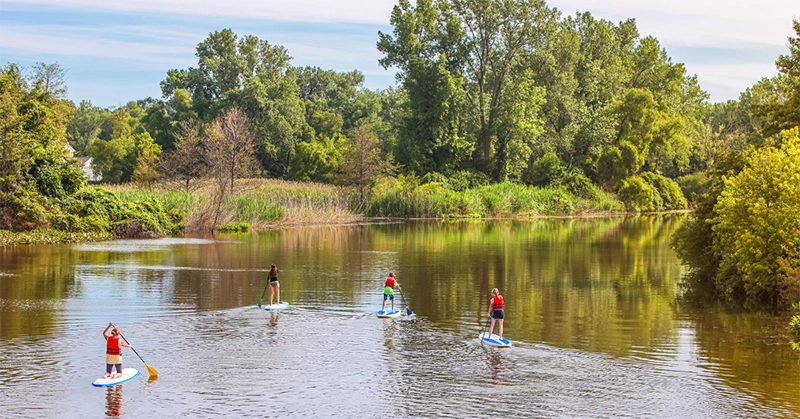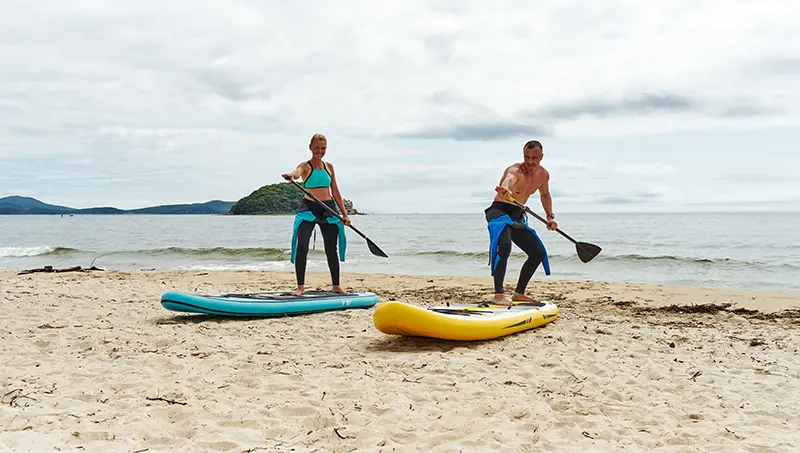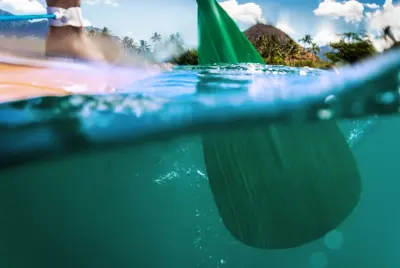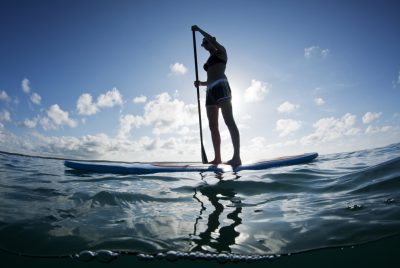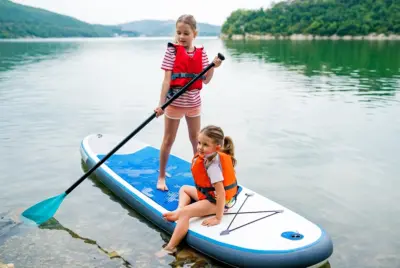Paddle Board Lessons: Understanding the Importance
We may earn a commission for purchases made using our links. Please see our disclosure to learn more.
Paddle Board Lessons are the focus of this guide as we delve into the exhilarating world of paddle boarding and underscore the importance of learning proper techniques.
Unveiling the Fascination of Paddle Boarding
The Experience of Paddle Boarding
Paddle boarding is an enriching experience, connecting you with nature while gliding through tranquil waters. The sport offers a unique perspective, granting you the ability to explore and enjoy diverse water bodies.
Health and Fitness Aspects of Paddle Boarding
More than a recreational activity, paddle boarding offers notable health benefits. It provides a total body workout, improving balance, strengthening muscles, enhancing endurance, and contributing to cardiovascular fitness.
Significance of Paddle Board Lessons
Emphasis on Safety
Safety is paramount in any water sport. In paddle boarding, understanding and navigating potential risks are crucial. Lessons will teach you how to handle various conditions, from calm waters to unexpected currents or winds, ensuring your safety while paddle boarding.
Importance of Acquiring Proper Techniques
Paddle board lessons provide invaluable insights into correct paddling techniques, maneuvers, and postures. These skills not only contribute to a more efficient paddling experience but also minimize the risk of injury.
Paddle Board Lessons Factors to Consider
Size and Build
Choosing your paddle board is a pivotal decision. Factors such as the board’s size, weight capacity, and build material are essential considerations that will impact your paddle boarding experience.
Different Styles of Paddle Boards
Various styles of paddle boards cater to different activities and skill levels. Whether it’s a versatile all-around board, a speed-oriented touring board, or a stable yoga board, selecting the appropriate type is crucial.
Identifying High-Quality Paddle Board Lessons
Choosing the right paddle board lessons is crucial in shaping your initial experience with the sport. High-quality lessons will not only equip you with the necessary skills and confidence but also instill a lifelong love for the sport. Here are a few considerations to help you identify top-notch paddle board lessons.
Instructor Qualifications
The instructor’s qualifications should be one of your first considerations. They should be certified by recognized bodies such as the American Canoe Association or the Academy of Surfing Instructors. Certification ensures that they have undergone proper training, are aware of the latest safety protocols, and are capable of effectively teaching paddle boarding techniques.
Lesson Curriculum
An excellent paddle board lesson should have a well-structured curriculum that covers basic techniques, safety procedures, and local water rules and regulations. The curriculum should also be adaptable to cater to different skill levels, learning speeds, and objectives of the participants.
Class Size and Teaching Structure
Look for lessons that maintain a manageable student-to-teacher ratio. A smaller class size often allows for more personalized instruction, ensuring you get the attention and feedback you need to improve. The teaching structure should also foster a supportive and fun learning environment.
Practical and Theoretical Learning
Paddle boarding is a hands-on sport, but theoretical knowledge is equally important. The right lessons will strike a balance between on-water practice and off-water theory sessions. Understanding concepts such as board dynamics, water conditions, and safety protocols are essential for becoming a proficient paddle boarder.
Paddle Board Lessons Follow-Up Opportunities
Top-notch lessons often provide follow-up opportunities like advanced lessons, club memberships, or organized group paddles. These opportunities not only let you further hone your skills but also introduce you to the paddle boarding community, adding a social aspect to the sport.
Testimonials and Reviews
Don’t underestimate the power of reviews and testimonials. They provide real-life insights into the experiences of past students. Look for feedback on the instructor’s teaching ability, lesson organization, safety protocols, and overall class environment.
Remember, the goal is to find a lesson that not only teaches you the fundamentals but also instills a sense of confidence, safety, and passion for paddle boarding. Take your time, do your research, and you’ll be on your way to a fantastic paddle boarding journey.
Readying Yourself for the First Lesson
Stepping into your first paddle board lesson can be both exhilarating and a little daunting. But don’t worry, with a little preparation, you’ll be ready to hit the water confidently and make the most out of this new adventure.
Setting Expectations
Understanding what to anticipate during your first lesson can ease any nerves you may have. Typically, a lesson begins with an on-land introduction. This includes an overview of the equipment, basic paddle techniques, safety procedures, and some time to ask questions. Following the on-land introduction, you’ll move to the water, where the real fun begins. You’ll start with learning to balance on the board, progressing to standing, and eventually to paddling and steering. Remember, it’s okay if you don’t master everything in the first lesson. The key is to learn at your own pace and, most importantly, enjoy the experience.
Paddle Board Lessons Equipment Checklist
One thing you need to be comfortable with for your first lesson is the equipment you’ll be using. A paddle board lesson usually provides the main gear, including a paddle board, paddle, and a leash. You may also be given a personal flotation device, depending on the rules of your local area.
However, there are a few personal items you will need to bring to ensure you’re adequately prepared:
Swimwear: Choose a comfortable swimwear option that you’re happy to get wet and possibly fall into the water in.
Sun Protection: A hat, sunglasses, and sunscreen are critical, even on a cloudy day. The sun’s reflection off the water can be intense.
Water: Paddle boarding can be a workout, so bring a water bottle to stay hydrated.
Towel and Change of Clothes: A towel for drying off after the lesson and a fresh change of clothes will be much appreciated, particularly if you’re heading somewhere afterward.
Snacks: Depending on the duration of your lesson, you might want to bring a small snack like a granola bar or fruit to recharge your energy.
Positive Attitude: This is your most crucial gear. Go into your first lesson with an open mind, ready to learn and have fun. Remember, everyone starts as a beginner!
By taking the time to prepare yourself for your first paddle board lesson, you’ll be setting yourself up for success. So take a deep breath, trust your instructor, and get ready to embark on a fantastic new adventure.
Optimizing the Value of Your Paddle Board Lessons
Practice and Persistence
Mastering paddle boarding takes time and persistence. Regular practice and applying what you’ve learned in lessons will accelerate your progress and proficiency in the sport.
Integration into the Paddle Board Community
Paddle boarding is more than just a sport; it’s a thriving community. Participating in local events and gatherings can enhance your paddle boarding experience, making it more enjoyable and rewarding.
Conclusion
Paddle board lessons play an essential role in introducing newcomers to this rewarding sport. They promote safety, help develop proper techniques, and offer an effective gateway to the broader paddle boarding community.
Frequently Asked Questions
1. What is the typical duration of learning paddle boarding?
The duration it takes to learn paddle boarding can vary greatly depending on the individual’s athletic ability, balance, and comfort in the water. However, with professional instruction during paddle board lessons, most beginners can learn the basics and feel comfortable on the board within one to three lessons.
2. What attire is suitable for paddle board lessons?
For paddle board lessons, wear something you’re comfortable getting wet. Swimwear is usually a good choice. Depending on the weather and water temperature, you may also want to consider wearing a rash guard for sun protection, or a wetsuit or dry suit for colder conditions. Always remember to apply waterproof sunscreen and bring a towel.
3. Can children participate in paddle board lessons?
Absolutely. Paddle boarding is a family-friendly sport. However, the age at which children can start paddle boarding lessons depends on their individual strength, coordination, and comfort in the water. It’s always best to check with the paddle board school or instructor to see if they have any specific age requirements or recommendations.
4. What is the cost range for paddle board lessons?
The cost of paddle board lessons can vary widely depending on the location, the experience of the instructor, and the length and structure of the lessons. On average, you might expect to pay anywhere from $30 to $100 per lesson. Some schools or instructors might offer discounted rates for package deals or group lessons.
5. Is swimming proficiency a prerequisite for paddle boarding?
Being comfortable in the water is important for paddle boarding, and knowing how to swim is highly recommended. While falling off the board is normal and part of the learning process, it’s essential to be able to swim back to your board or to shore if necessary. Also, wearing a personal flotation device (PFD) during paddle boarding is mandatory in some areas and always a good safety measure.

